Eight ideas to defeat woke capture
How the Government could approach the wokery blighting Blighty
Today I realised that I have been researching taxpayer-funded wokery for at least six months (you can hear a bit about the “journey” that led here in the latest Bombshells podcast).
Far from finding that I have less to discover the more I keep searching, the woke waste seems never-ending. I suspect some of this is because the more I nose around, the better I understand the mechanisms and flows of taxpayer money in our economic/ political system; to recognise trust names where I had never heard of them before, and how to find things that may be buried (not necessarily on purpose, but nonetheless, a bit hard to find). I find the project both alarming and fascinating. I probably feel like how Chris Packham does about a tree he loves, apart from my new cool hobby has become reading the Charity Register.
But I digress. As I have been going along I have started to think of some ideas to combat woke. Looking at the amount of taxpayer money that has been haemorrhaged on ideological madness it’s easy to get “glass half empty” about things; to think there’s no return; and that we shall all be living under the tyranny of our Woke Ayatollahs forever.
However, I think there’s something to be said for knowing how much woke is subsidised. Ultimately, it is our money, and we do have rights - even if it’s not exactly like getting a return from ASOS. There’s also reassurance in realising that money is the oxygen of woke. It can’t survive without funding because the majority thinks it’s bollocks. Even when we spend huge amounts on the arts, for instance, the sector is always whinging about how “the arts is on its knees”. Maybe because there’s no market demand for plays about non-binary Joan of Arcs and the other tosh we have been subjected to.
It sounds obvious but I think it’s very important that we understand exactly how much has been spent, and through what mechanisms. It’s the opaque nature of the system that stops us from taking control, which is sort of what spurs my “Woke Waste” mission (and my balance sheet), albeit it is starting to look like a massive job (not to complain, it’s just like dealing with Japanese knotweed, or the hydra, where you cut off one head and two asexual climate justice professors pop up).
Anyway, without further ado, here are some initial ideas for how the Government could deal with woke. Maybe slightly immaterial if Labour come in, but something to chew over. Feel free to leave comments with your own suggestions. Stay awoken!
A new secular charter
Just as The Home Secretary can choose to proscribe an organisation under the Terrorism Act 2000 (excuse the dramatic example but it’s the easiest comparison) the Government needs to define “secular” principles for the 21st century. In other words, to clearly show what activities/ words breach secularism in the public sector.
Traditionally secularism is thought of in regards to religion - the separation of Christianity and state in the UK. But we need to reconsider it in the prism of woke ideology, which is a belief system - used to override Enlightenment principles.
It’s worth considering woke in the context of this quote from The National Secular Society (in 2020) when it defined secularism in written evidence to the Government:
1.2. In a secular democracy all citizens are equal before the law and parliament. No religious or political affiliation gives advantages or disadvantages and religious believers are citizens with the same rights and obligations as anyone else. In the 21st century no religion should be granted a privileged position.
How many can say this is the case when it comes to woke? Clearly its “believers” gain advantages in the system. For instance, Arts Council England (ACE) awards funding based on whether you embed investment principles such as “diversity” and “environmental responsibility” into your work.
Just as The Charity Commission - the independent regulator of charities in England and Wales (a hopeless regulator, incidentally) - says that “a charity cannot have political activity as any of its charitable purposes”, so must state-funded institutions be prevented from going into woke territory.
Were I to think of a quick list with activities/ ideas/ words that organisations shouldn’t promote, it would look like the following:
Pronouns/ pronoun badges (for instance, Civil Servants should not be writing emails from “She/Her”)
Using cisgender as a term
Using “lived experience”/ “social justice” in medicine or any other state-funded research
Fines for organisations that breach the secular charter
Every time an institution breaches the secular charter, it should be fined and/ or lose its funding (perhaps a two or three/strike policy). Currently there doesn’t seem to be much monitoring of taxpayer-funded institutions. Thus they get away with incredibly radical and divisive ideas, completely at odds to the Government’s (and what taxpayers want), with no one ever ticking them off. Money is the oxygen of woke and it needs to be used to enforce secularism.
Defund AHRC
During my Woke Waste series I have been the most shocked by studies funded by the Arts and Humanities Research Council, under UKRI.
AHRC has £207 million to spend from 2022-25, which it has poured into projects such as Trans Performance Now: Glitching cisgenderism (£185,627) and The Europe That Gay Porn Built, 1945-2000 (£841,830).
I find that AHRC has few redeeming features, its studies being awful to the point of being an art. Some other examples:
Porcelain used as ‘critique of white supremacy’ in taxpayer-funded study
Taxpayer funds Phd in ‘how gardens can cultivate queer anti-racist communities’
Defund!
Defund Arts Council England
Same for ACE. Overall, there should be a proportion of money allocated to Britain’s finest cultural institutions: The Royal Opera House, The Globe, The National Gallery and so forth.
But ACE is helping to ruin the reputation of these places, thanks to its woke “investment principles” - meaning every show reinforces the state religion.
ACE has a habit of funding utter nonsense. More troublingly, it’s a sponsor of Thurrock Pride Festival where Drag Syndrome, “the world's first and only collective of drag queens and kings with Down syndrome” are playing this Saturday. You have to wonder how much this collective can consent to being poster boys and girls for a highly-politicised (and sexualised, in the case of drag) movement.
Here are other examples of ACE-funded wokery:
Soho Theatre tells white audience members to ‘check their privilege’
Trans artist’s search for a sperm donor given £64,000 of taxpayer cash
Restrictions on trust donations
Foundations and trusts pour huge amounts into wokery.
One of the worst examples I’ve found is The Paul Hamlyn Foundation (PHF) which runs its own Migration Fund - essentially advocating open borders:
We envision a world in which everyone is free to move, and no one is forced to move.
How else could you interpret this ideal?
I suspect many people have never heard of PHF, never mind know what it’s funding (A LOT).
One its most famous beneficiaries is HOPE not hate
The organisation has been awarded the its “Migration Fund” three times, receiving £585,000 in total (not just the Migration Fund) from PHF.
Here’s my full piece on it, in case of interest:
Other recipients of PHF’s generosity include a global majority theatre company - awarded £166k.
An organisation supporting people “affected by the Hostile Environment” - awarded £210k.
“racialised communities” - £150,000
It’s also given £133,000 to that charity we all know and love, Mermaids:
In general, I find PHF’s funding choices very divisive. The foundation has given hundreds of thousands to multiple organisations whose raison d’être is magnifying racial differences and grievances (“hostile environment”). In our woke world this is presented as caring/ social justice, but it’s completely counterproductive to social cohesion, pointing out our differences and discouraging people of different ethnicities and backgrounds meeting.
In due course I will do a long read about PHF (and the numerous other trusts pouring money into the arts, charity and public sector. Sometimes there’s an interplay between these different wings, in terms of money going back and forth. Woke waste is actually rather incestuous…)
Reform the Charity Commission
The Charity Register is an absolute horror show, I’ve got to say.
I’l give you an example. Yesterday I discovered The Shrouk El-Attar Trust. It all looks rather professional below.
But then you have a look at the charity’s other online profiles, such as Instagram:
And the trust’s website:
You have to wonder what the Charity Commission is up to.
Do we want a drag belly dancing trust whose goal is “to primarily support the LGBT+ community in Egypt and other surrounding nations”?
Bizarrely I found out that SEAT has been funded (not a big amount in the grand scheme of things) by the Quartet Community Foundation:
This received £1.80m in government grants last year…
This isn’t to say that money went directly went to The Shrouk El-Attar Trust from the Quartet Community Foundation. Just to ask why taxpayer money is being given to the latter, which clearly has hideous judgement.
Return to voluntary contributions
In general, I’ve been amazed by the account the government/ local government gives to charities. Perhaps naively I always thought that charities received voluntary contributions, not that the Home Office gave taxpayers’ money to the likes of HOPE not hate (£141,380 from 2019-2020).
Making most charity contributions voluntary would end SO much wokery, as all the awful ideological ones would go bust.
Don’t buy a National Lottery ticket
One of the easiest ways you can take back control is to not purchase a National Lottery ticket (if you already do).
I’ll give you a few examples which will explain why:
You get the idea. I’ll do more on The National Lottery in due course.
Over and out. Any paid subscriptions much appreciated; the oxygen to my own endeavours (of woke hunting). Thank you to those who have subscribed so far!
More reading:




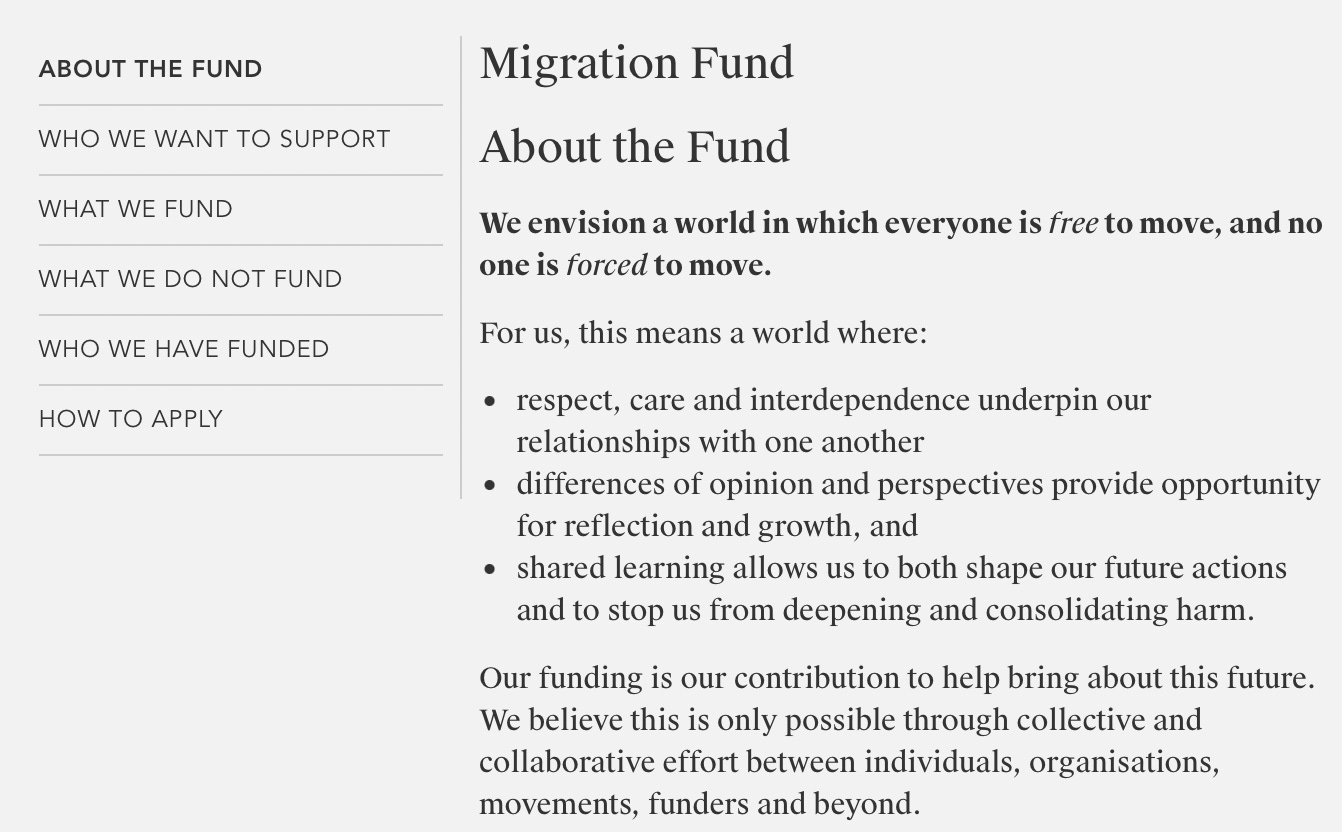
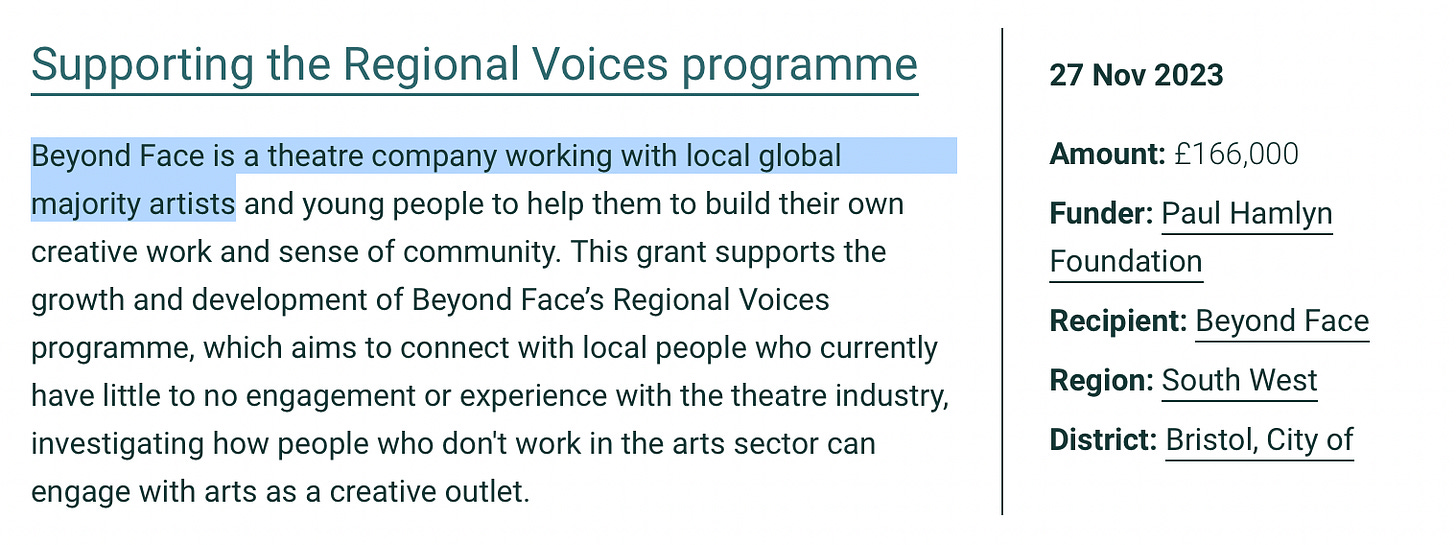
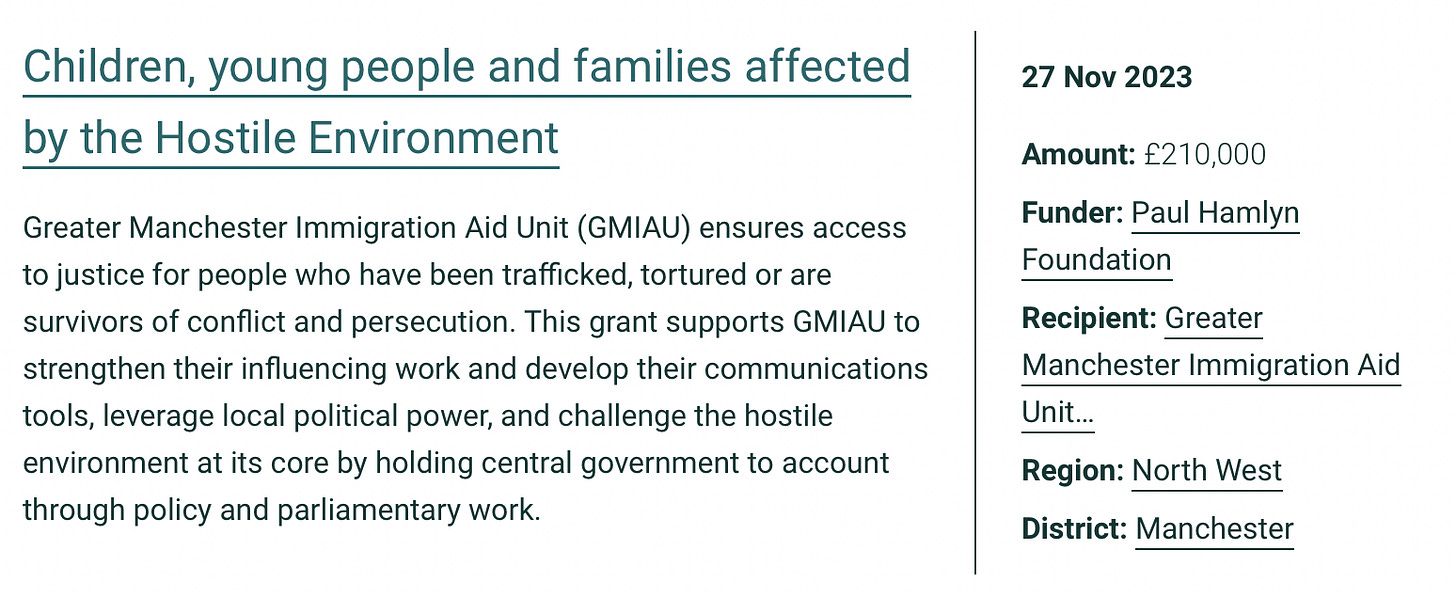
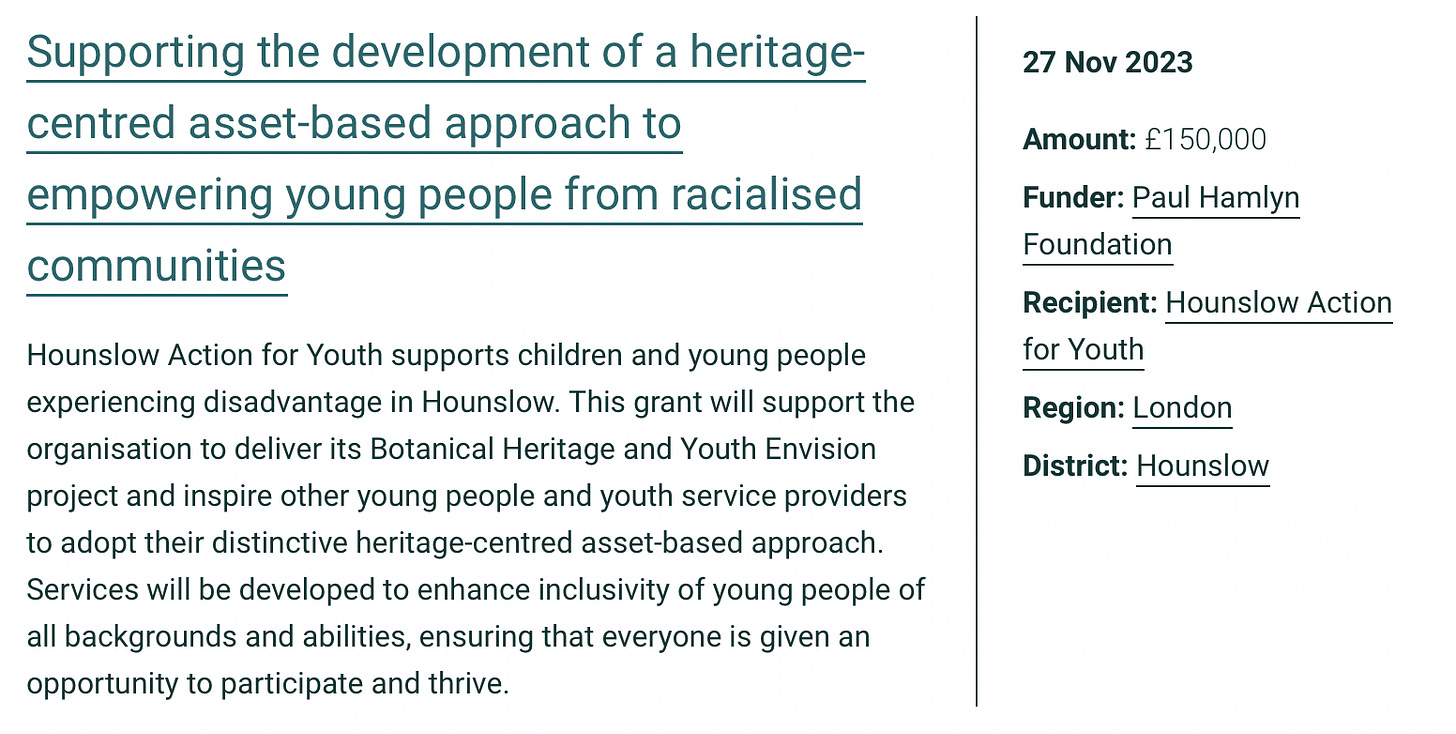
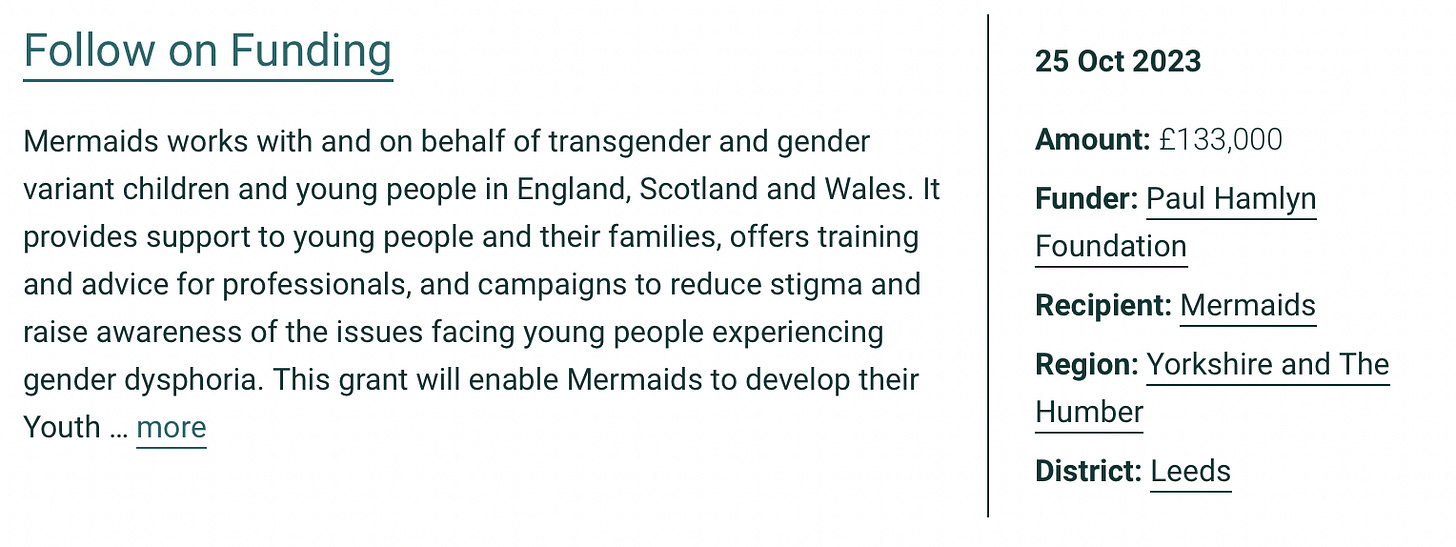
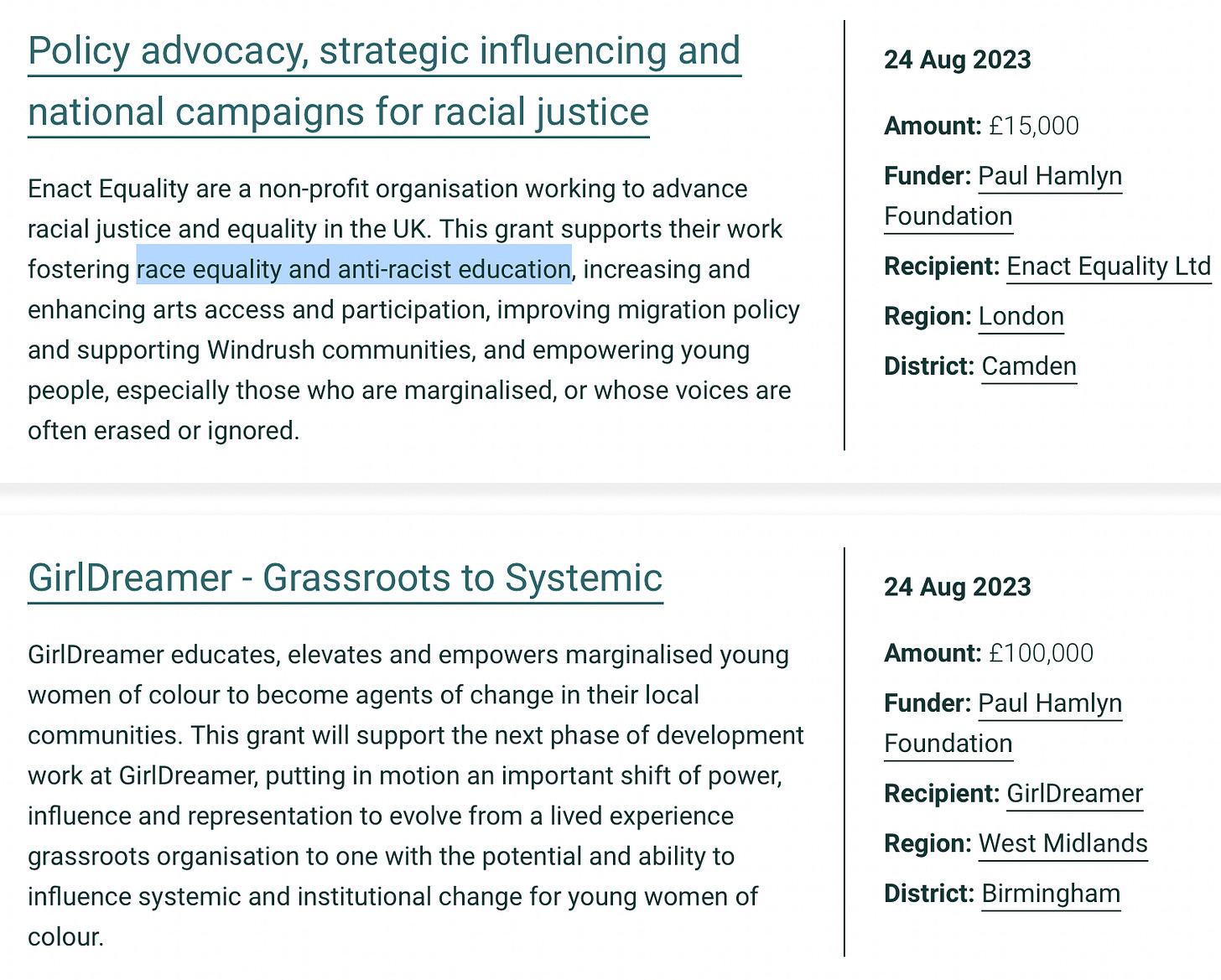
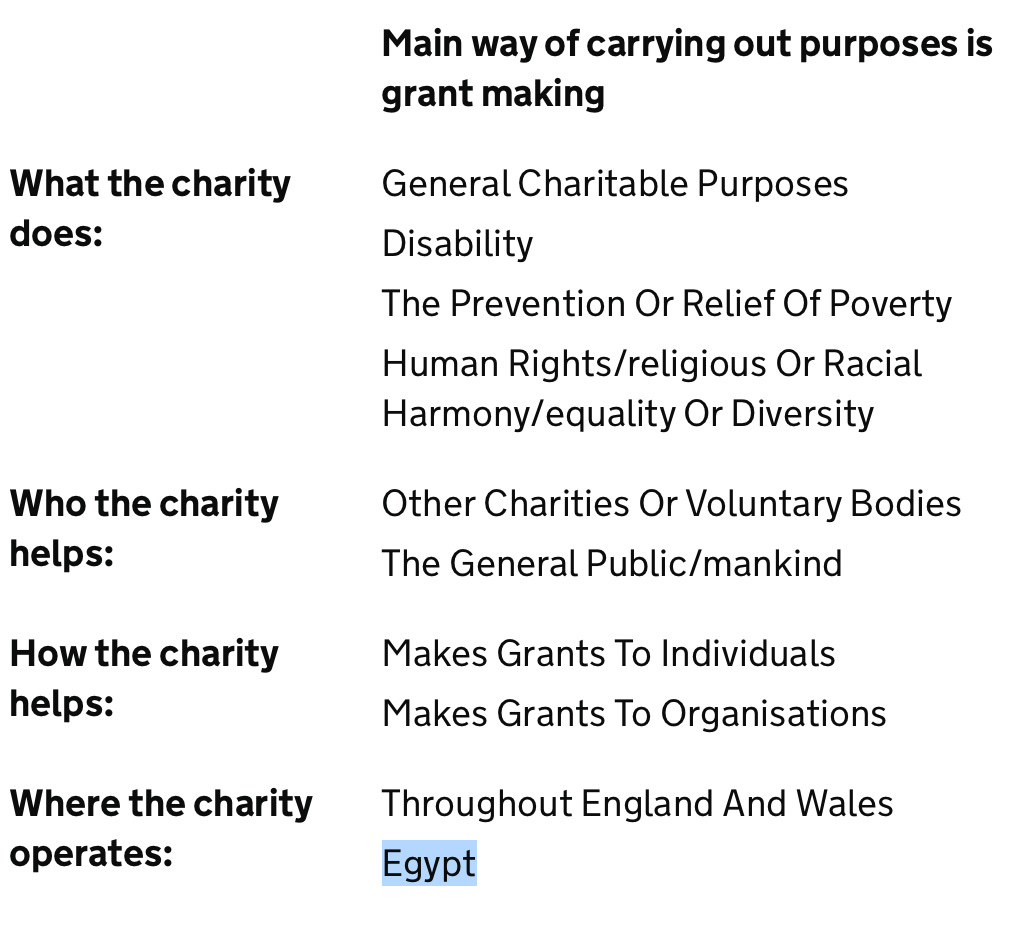





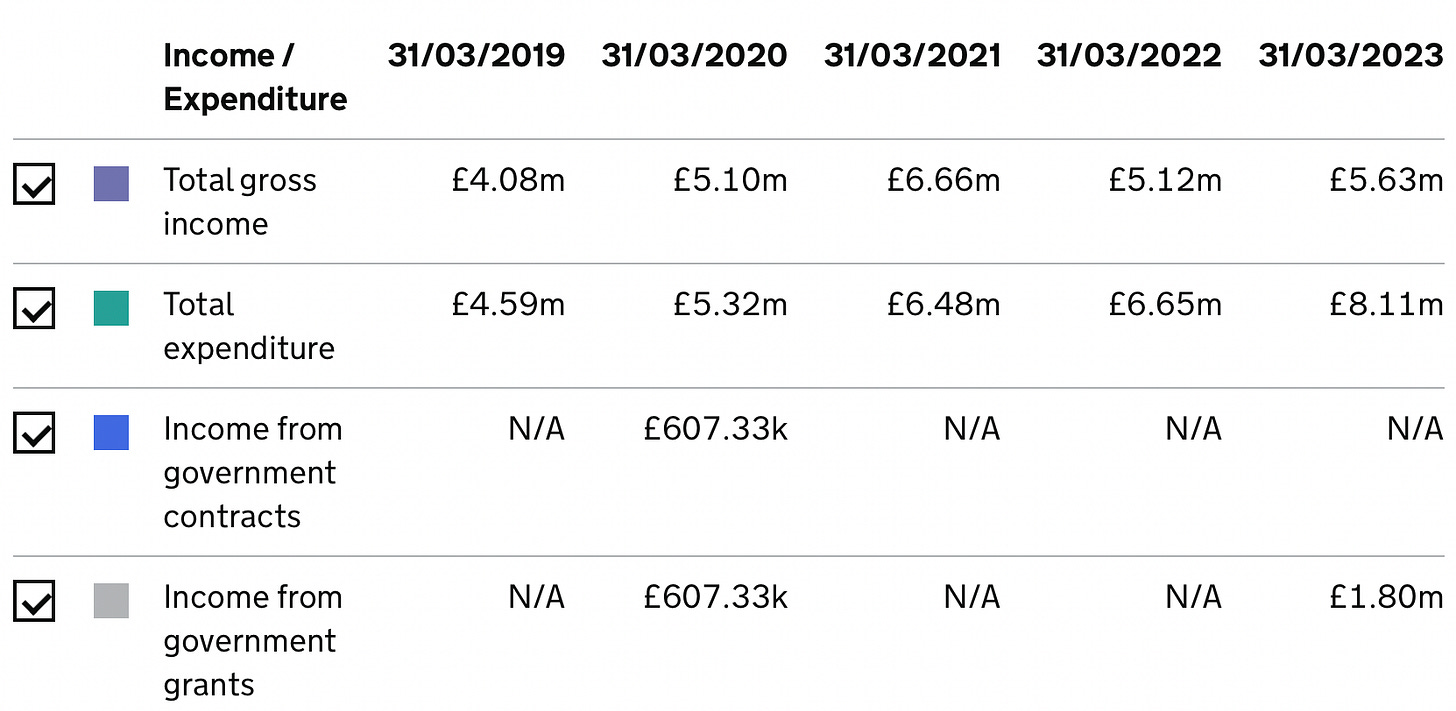
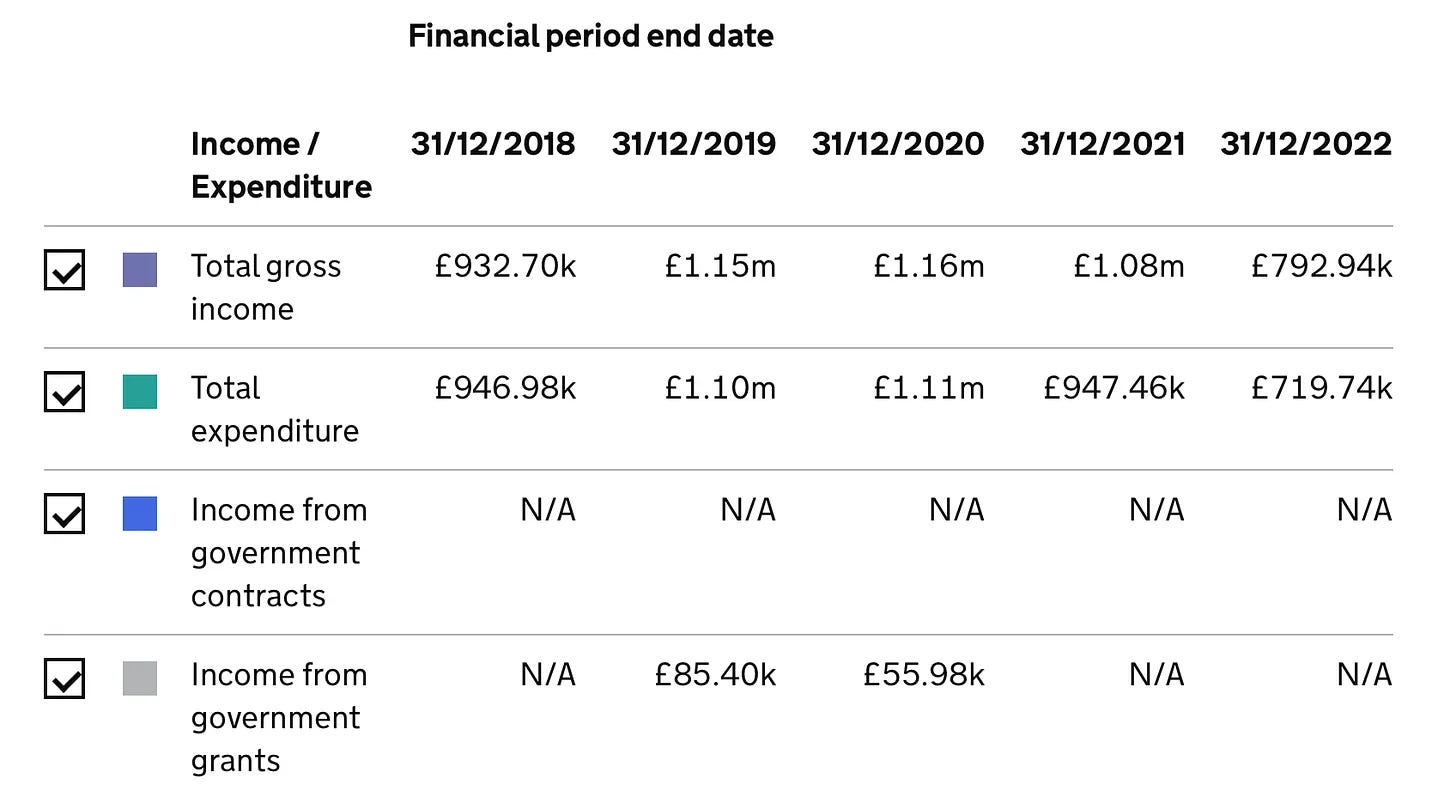
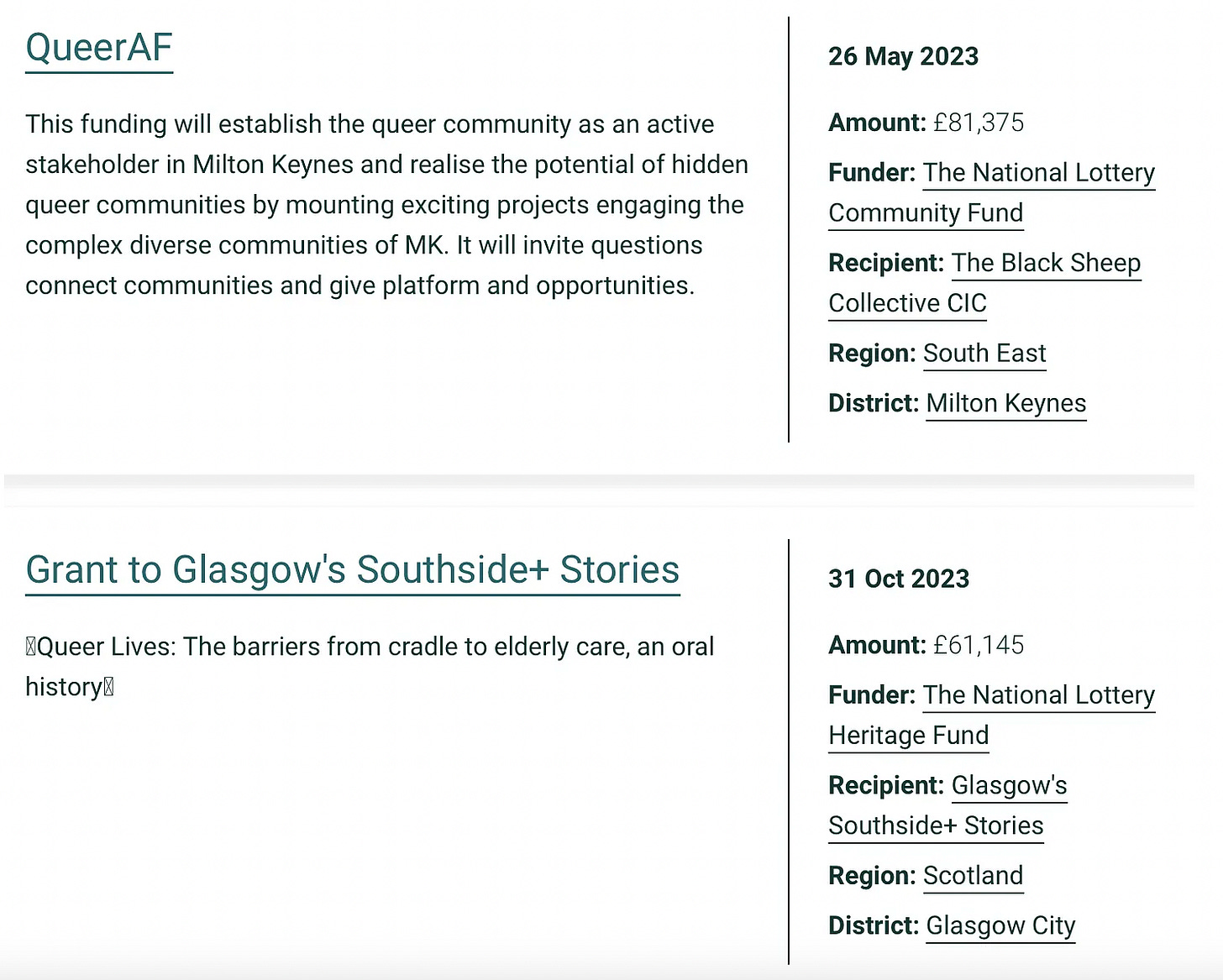
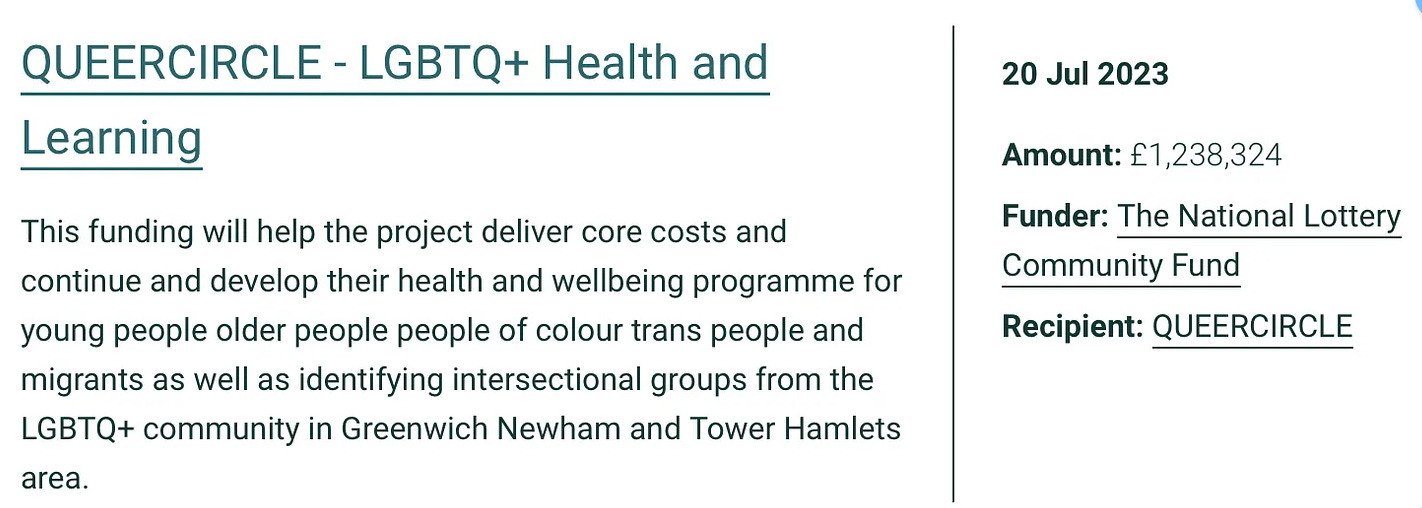
Great research 👏👏
“Overall, there should be a proportion of money allocated to Britain’s finest cultural institutions: The Royal Opera House, The Globe, The National Gallery and so forth.”
Hmmm. The definitional problem of “finest cultural institution” is not to be underestimated; expect many bunfights at the margin of inclusion versus exclusion. And what is the reason why such institutions are deemed to be a public good which must exist on taxpayer money? Why can’t they all be told to sink or swim in the market place based on their ability to attract memberships, ticket sales and sponsorship?
Personally I would close down the Ministry of Culture, Media & Sport (under which ACE lives) altogether; I can’t accept that any of these activities are taxpayer matters.